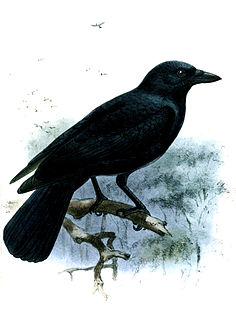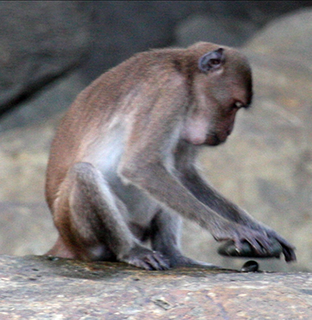Related Research Articles

In behavioral psychology, reinforcement is a consequence applied that will strengthen an organism's future behavior whenever that behavior is preceded by a specific antecedent stimulus. This strengthening effect may be measured as a higher frequency of behavior, longer duration, greater magnitude, or shorter latency.

The New Caledonian crow is a medium-sized member of the family Corvidae, native to New Caledonia. The bird is often referred to as the 'qua-qua' due to its distinctive call. It eats a wide range of food, including many types of invertebrates, eggs, nestlings, small mammals, snails, nuts and seeds. The New Caledonian crow sometimes captures grubs in nooks or crevices by poking a twig at the grub to agitate it into biting the twig, which the crow then withdraws with the grub still attached. This method of feeding indicates the New Caledonian crow is capable of tool use. They are also able to make hooks. This species is also capable of solving a number of sophisticated cognitive tests which suggest that it is particularly intelligent. As a result of these findings, the New Caledonian crow has become a model species for scientists trying to understand the impact of tool use and manufacture on the evolution of intelligence.
Douglas Alexander Spalding was a British biologist who studied animal behaviour and worked in the home of Viscount Amberley.

The difficulty of defining or measuring intelligence in non-human animals makes the subject difficult to study scientifically in birds. In general, birds have relatively large brains compared to their head size. The visual and auditory senses are well developed in most species, though the tactile and olfactory senses are well realized only in a few groups. Birds communicate using visual signals as well as through the use of calls and song. The testing of intelligence in birds is therefore usually based on studying responses to sensory stimuli.

The Crow and the Pitcher is one of Aesop's Fables, numbered 390 in the Perry Index. It relates ancient observation of corvid behaviour that recent scientific studies have confirmed is goal-directed and indicative of causal knowledge rather than simply being due to instrumental conditioning.
Behavioral momentum is a theory in quantitative analysis of behavior and is a behavioral metaphor based on physical momentum. It describes the general relation between resistance to change and the rate of reinforcement obtained in a given situation.

Tool use by animals is a phenomenon in which an animal uses any kind of tool in order to achieve a goal such as acquiring food and water, grooming, defense, communication, recreation or construction. Originally thought to be a skill possessed only by humans, some tool use requires a sophisticated level of cognition. There is considerable discussion about the definition of what constitutes a tool and therefore which behaviours can be considered true examples of tool use. A wide range of animals, including mammals, birds, fish, cephalopods, and insects, are considered to use tools.
Russell David Gray is a New Zealand evolutionary biologist and psychologist working on applying quantitative methods to the study of cultural evolution and human prehistory. In 2020, he became a director of the Max Planck Institute for Evolutionary Anthropology in Leipzig. Although originally trained in biology and psychology, Gray has become well known for his studies on the evolution of the Austronesian language family using computational phylogenetic methods.
Joseph A. Bulbulia is a Professor of Psychology in the Faculty of Science at Victoria University of Wellington (2020-present). He was the Maclaurin Goodfellow Chair in the School of Humanities, Faculty of Arts at University of Auckland (2018-2020). He previously served as a Professor in the School of Art History, Classics and Religious Studies at Victoria University of Wellington. Bulbulia is regarded as one of the founders of the contemporary evolutionary religious studies. He is a past President of the International Association for the Cognitive Science of Religion and is currently co-editor of Religion, Brain & Behavior. Bulbulia is one of four on the Senior Management Team of the New Zealand Attitudes and Values Study, a 20-year longitudinal study tracking over 15,000 New Zealanders each year. He is an associate investigator for Pulotu, a database of 116 Pacific cultures purpose-built to investigate the evolutionary dynamics of religion. In 2016 Bulbulia won a Research Excellence Award at Victoria University.
Elizabeth Mary Rata is a New Zealand academic who is a sociologist of education and a professor in the School of Critical Studies in Education at the University of Auckland. Her views and research on Māori education and the place of indigenous knowledge in the New Zealand education system have received criticism from other academics.
The 2013 New Year Honours in New Zealand were appointments by Elizabeth II in her right as Queen of New Zealand, on the advice of the New Zealand government, to various orders and honours to reward and highlight good works by New Zealanders, and to celebrate the passing of 2012 and the beginning of 2013. They were announced on 31 December 2012.
The 2016 New Year Honours in New Zealand were appointments by Elizabeth II in her right as Queen of New Zealand, on the advice of the New Zealand government, to various orders and honours to reward and highlight good works by New Zealanders, and to celebrate the passing of 2015 and the beginning of 2016. They were announced on 31 December 2015.
The 2017 Queen's Birthday Honours in New Zealand, celebrating the official birthday of Queen Elizabeth II, were appointments made by the Queen in her right as Queen of New Zealand, on the advice of the New Zealand government, to various orders and honours to reward and highlight good works by New Zealanders. They were announced on 5 June 2017.
The 2015 Queen's Birthday Honours in New Zealand, celebrating the official birthday of Queen Elizabeth II, were appointments made by the Queen in her right as Queen of New Zealand, on the advice of the New Zealand government, to various orders and honours to reward and highlight good works by New Zealanders. They were announced on 1 June 2015.
The 2014 Queen's Birthday Honours in New Zealand, celebrating the official birthday of Queen Elizabeth II, were appointments made by the Queen in her right as Queen of New Zealand, on the advice of the New Zealand government, to various orders and honours to reward and highlight good works by New Zealanders. They were announced on 2 June 2014.
The 2006 Queen's Birthday Honours in New Zealand, celebrating the official birthday of Queen Elizabeth II, were appointments made by the Queen in her right as Queen of New Zealand, on the advice of the New Zealand government, to various orders and honours to reward and highlight good works by New Zealanders. They were announced on 5 June 2006.
Kendall David Clements is a New Zealand academic and as of 2021 is a full professor at the University of Auckland specialising in the ecology and evolution of fish.
Robert Nola is a New Zealand philosophy academic, and as of 2021 is an emeritus professor at the University of Auckland. His work has focussed on the philosophy and history of science, on epistemology and on metaphysics.

John Scott Werry is a New Zealand psychiatry academic and as of 2021 is an emeritus professor at the University of Auckland.
Tara G McAllister is a New Zealand freshwater ecology academic and is associated with Te Pūnaha Matatini at the University of Auckland. She is a Māori of Te Aitanga ā Māhaki and Ngāti Porou descent.
References
- 1 2 "Professor Douglas Elliffe – the University of Auckland".
- ↑ Kendall Clements, Garth Cooper, Michael Corballis, Douglas Elliffe, Robert Nola, Elizabeth Rata, and John Werry. “In Defence of Science.” New Zealand Listener, 31 July 2021. p.4